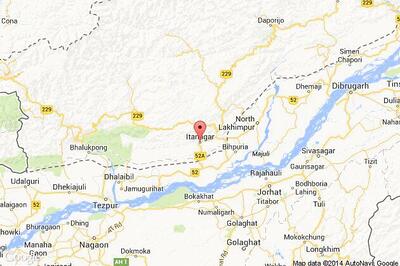
views
New Delhi: Even as the Supreme Court-mandated panel on Friday declared a public health emergency in Delhi on account of severe air quality, the BJP-led central government has claimed that the crop stubble burning in Delhi’s neighbouring states has decreased by 41% between 2016 and 2018.
According to the affidavit filed by the Ministry of Environment, Forest and Climate Change (MoEF&CC) in the Supreme Court, Punjab remained at the bottom of Delhi’s adjoining states in reducing its share of the toxic haze.
On Friday morning, the overall air quality in Delhi-NCR deteriorated to 425, falling in the “severe” category, according to the System of Air Quality and Weather Forecasting and Research (SAFAR). Chief Minister Arvind Kejriwal said the national capital has turned into a “gas chamber” due to crop burning in neighbouring states.
The Environment Pollution (Prevention and Control) Authority (EPCA) declared a public health emergency in Delhi-NCR and banned construction activity till November 5. Kejriwal also announced that all schools in the Capital will remain closed till Tuesday.
The EPCA has also asked implementing agencies to take immediate stringent action to stop stubble-burning in Punjab and Haryana. Stubble-burning in the neighbouring states has been one of the major contributors to pollution in the national capital. On Thursday, stubble-burning in Punjab and Haryana contributed to 27% pollution in Delhi, while on Wednesday the contribution was recorded at 35%, the highest so far.
Meanwhile, in the affidavit filed on the direction of the top court on October 22, the central government admitted that stubble burning is a chief cause of bad air in Delhi-NCR in the months of October and November. The government added that it is taking all possible measures, including additional budgetary allocation to the states of Punjab, Haryana and Uttar Pradesh, to reduce the menace.
The MoEF&CC cited a government-mandated study conducted using satellite remote sensing to lay down statistics regarding reduction in the crop stubble burning. It said there has been a reduction of about 15% and 41% in the number of burning events in 2018 as compared to 2017 and 2016, respectively.
“It may also be noted that for the year 2018, there has been a reduction of 11%, 29.5% and 24.5% in the number of burning events as compared to 2017 in the states of Punjab, Haryana and Uttar Pradesh respectively,” said the ministry in its affidavit.
The statistics show that while the reduction in stubble burning was the highest in Haryana among the three states, Punjab’s contribution was not even half of its other two neighbours.
The government said that in order to prevent stubble burning, a new central sector scheme on the promotion of agricultural mechanisation for in-situ management of crop residue has also been approved for 2018-19 and 2019-20 with a total outlay of Rs 1,151.8 crore.
It maintained that for 2018-19, the central government released 100% share of its funds to the three states and central agencies for distribution of required machineries, giving subsidies on custom hiring of the machines, and for spreading awareness among famers.
“States have also been asked to put in place a strict surveillance and enforcement mechanism to prevent stubble burning around the peak season. Moreover, the states have also been asked to put incentive schemes in place for honouring village/gram panchayats/pradhans that achieve zero stubble burning,” said the affidavit.
The MoEF&CC further apprised the Supreme Court that a High Level Task Force on the management of air pollution in Delhi-NCR is meeting periodically to address all concerns.
A special bench on environment-related matters, headed by Justice Arun Mishra, on October 14 had sought a response from the Centre on the steps being taken to contain the hazard of indiscriminate crop stubble burning, worsening the air quality in Delhi-NCR.
The matter was to be taken up on October 25, but since the special bench could not meet that day, the issue is now expected to be heard next week.


















Comments
0 comment